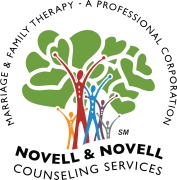We are a multidisciplinary team of mental health professionals providing high quality, caring, independent outpatient mental health services to the community since 1990.
Over the years, we have developed a group of skilled professionals who can provide help for a wide variety of problems through the services and specialties listed here.
Individual Therapy – Types
a. Cognitive Behavioral
b. Dialectical Behavioral
c. Psycho-Dynamic
d. Gestalt
e. Client Centered
f. Solution Focused
g. Interpersonal psychotherapy
h. Narrative therapy
i. Expressive therapy
j. Existential
k. Rational Emotive Therapy
Couples Therapy
a. Conflict Resolution
b. Communication Skills
c. Sexual dysfunction
d. Infidelity & Trust
e. Financial Conflict
f. Domestic Abuse
g. Addictions
h. Parenting
Family Therapy
Family Therapy – is a branch of psychotherapy that works with families and couples in intimate relationships to nurture change and development. It views change in terms of the systems of interaction between family members. It emphasizes family relationships as an important factor in psychological health.
Family therapy has a belief that, regardless of the origin of the problem, and regardless of whether the clients consider it an “individual” or “family” issue, involving families in solutions is often beneficial. This involvement of families is commonly accomplished by their direct participation in the therapy session. The skills of the family therapist thus include the ability to influence conversations in a way that catalyses the strengths, wisdom, and support of the wider system.
Play Therapy
Play Therapy – generally employed with children aged 3 through 11 provides a way for them to express their experiences and feelings through a natural, self-guided, self-healing process. As children’s experiences and knowledge are often communicated through play, it becomes an important vehicle for them to know and accept themselves and others.
Attachment Therapy
In general, these therapies are aimed at adopted or fostered children with a view to creating attachment in these children to their new caregivers. According to attachment theory, the child forms a strong emotional bond with caregivers during childhood with lifelong consequences.
Sensitive and emotionally available parenting helps the child to form a secure attachment style which fosters a child’s socio-emotional development and well-being. In extreme and rare conditions, the child may not form an attachment at all and may suffer from reactive attachment problems. Principles of attachment parenting aim to increase development of a child’s secure attachment and decrease insecure attachment.
EMDR
EMDR – Eye movement desensitization and reprocessing. This is a therapy to resolve the development of trauma-related disorders caused by exposure to distressing, traumatising, or negative life events, such as rape or military combat. The goal of EMDR therapy is to process these distressing memories, reducing their lingering influence and allowing clients to develop more adaptive coping mechanisms.
Group Therapy
a. Anger management – General anger management
b. Child abuse Parenting
c. Domestic Violence – Offenders only
d. Depression and Anxiety Recovery
e. Trichotillomania – “Hair Pulling”
f. Postpartum depression
g. Children’s expressive art & play
Teen Sexual Offenders
This program is generally for young adolescent males who have sexually perpetrated against a younger sibling or other child family member. Although the perpetration may also happen to other young children but are generally known to the family such as neighbors or close personal family friends.
Often the teenager’s behavior has been brought to the attention of the system and is required by courts to participate in sexual offender counseling. This counseling will focus on the teen accepting responsibility for the abuse, becoming educated as to the negative impact on the victim, developing victim empathy, identifying triggers leading to the abuse, exploring the teens own history of abuse, identifying emotional and self esteem issues, identifying family dynamics that contribute to the abuse occurring. Family therapy is often incorporated.
Treatment term is between 6-12 months but may last longer depending on teen motivation and progress.
Co-parenting
This is for parents of divorce who are either in the process of divorce or have been divorced and are experiencing difficulties in communicating about their children, resolving differences, and struggling with custodial sharing of the children.
The co-parenting is a direct service with both parents present at the same time with the therapist who helps the parents navigate their communication problems, provides suggestions as to possible solutions to conflict points, documents the issues brought to the sessions and agreed upon solutions, educates about the negative impacts on children of continued parental acrimony.
Anticipated number of sessions to complete is between 6 and 8 less if the parents are motivated to resolve their differences. This service is not covered by medical insurance. (…More information)
Parent-Child Reunification/Relationship Repair
Parent-Child Reunification/Relationship Repair – This program is designed to repair and reunify parent and child relationships. Sometimes a parent’s relationship with their children is interrupted for a period of time.
The causes can be multiple but whatever the reason a court has usually ordered reunification counseling for the child and parent who are estranged. This is not an evaluation service to make custodial recommendations to the court.
Custodial recommendations are typically made by the family law court mediator, an independent clinical psychologist assigned by the court to complete a 730 evaluation, or by minor’s counsel (Attorney) who is appointed by the court. The goal of this program is to repair and improve relationships between children and parents in compliance with orders from courts. Insurance does not cover this service.
